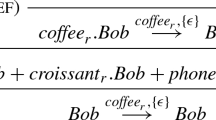Abstract
PSF/C is a formal specification language, based on COLD, a wide spectrum specification language developed at Philips Research, Eindhoven. In PSF/C, we can specify concurrent communicating processes. The process syntax and semantics is based on the algebraic concurrency language ACP.
Note: The first three authors are sponsored by Esprit contract 432, A Formal Integrated Approach to Industrial Software Development (Meteor). The first and second author are also sponsored by Race contract 1046, Specification and Programming Environment for Communication Software (Specs).
Preview
Unable to display preview. Download preview PDF.
Similar content being viewed by others
9 References
E. Astesiano, G.F. Mascari, G. Reggio, M. Wirsing, On the parametrised algebraic specification of concurrent systems, Proc. 10th Colloquium on Trees in Algebra and Programming (TAPSOFT), LNCS 185, pp. 342–358, Springer Verlag, 1985.
A.V. Aho & J.D. Ullman, Principles of Compiler Design, Addison-Wesley, Reading, Massachusetts, 1977.
J.C.M. Baeten & J.A. Bergstra, Global renaming operators in concrete process algebra, Inf. & Comp. 78 (3), 1988, pp. 205–245.
J.C.M. Baeten, J.A. Bergstra, S. Mauw & G.J. Veltink, A process specification formalism based on static COLD, report P8906b, Programming Research Group, University of Amsterdam 1990.
J.A. Bergstra, J. Heering & P. Klint (eds.), Algebraic specification, ACM Press Frontier Series, Addison-Wesley 1989.
J.A. Bergstra & J.W. Klop, Process algebra for synchronous communication, Information & Control 60, 1984, pp. 109–137.
J.A. Bergstra & J.W. Klop, Verification of an alternating bit protocol by means of process algebra, in: Math. Methods of Spec. & Synthesis of Software Systems '85, (W. Bibel & K.P. Jantke, eds.), Math. Research 31, Akademie-Verlag Berlin, pp 9–23, 1986.
J.A. Bergstra & J.W. Klop, Process algebra: specification and verification in bisimulation semantics, in: Math. & Comp. Sci. II, (M. Hazewinkel, J.K. Lenstra & L.G.L.T. Meertens, eds.), CWI Monograph 4, pp 61–94, North-Holland, Amsterdam, 1986.
L.M.G. Feijs, H.B.M. Jonkers, C.P.J. Koymans & G.R. Renardel de Lavalette, Formal Definition of the Design Language COLD-K, METEOR/t7/PRLE/7, 1987.
S.J. Goldsack, Specification of an operating system kernel: FOREST and VDM compared, in: VDM'88 (R.Blomfield, L.Marshall, R.Jones eds.) LNCS 328, pp. 88–100, Springer Verlag, 1988.
J. Heering & P. Klint, A syntax definition formalism, Report CS-R8633, Centre for Mathematics and Computer Science, Amsterdam, 1986.
J. Heering & P. Klint, A syntax definition formalism, in [BHK89], pp. 283–298.
International Organization for Standardization, Information processing systems — Open systems interconnection — LOTOS — A Formal Description Technique Based on the Temporal Ordering of Observational Behaviour, ISO/TC 97/SC 21, (E. Brinksma, ed.), 1987.
S.C. Johnson, YACC: yet another compiler-compiler, in: UNIX Programmer's Manual, Volume 2B, pp. 3–37, Bell Laboratories, 1979.
M.E. Lesk & E. Schmidt, LEX — A lexical analyzer generator, in: UNIX Programmer's Manual, Volume 2B, pp. 39–51, Bell Laboratories, 1979.
H. Morell Meerfordt, Combining CSP and Meta IV into an Ada Related PDL for developing Concurrent Programs, in: Ada in Industry, The Ada companion series (S. Heilbrunner, ed.), Cambridge University Press, pp. 157–171, 1988.
S. Mauw & G.J. Veltink, A process specification formalism, report P8814, Programming Research Group, University of Amsterdam 1988.
S. Mauw & G.J. Veltink, An introduction to PSF d , in: Proc. International Joint Conference on Theory and Practice of Software Development, TAPSOFT '89, (J. Díaz, F. Orejas, eds.) LNCS 352, pp. 272–285, Springer Verlag, 1989.
G.R. Renardel de Lavalette, COLD-K 2, the static kernel of COLD-K, Report RP/mod-89/8, Software Engineering Research Centrum, Utrecht, 1989.
J. Rekers, A Parser Generator for finitely Ambiguous Context-Free Grammars, Report CS-8712, Centre for Mathematics and Computer Science, Amsterdam, 1987.
M. Wirsing, J.A. Bergstra, eds., The Design Language COLD, section II in: Algebraic Methods: Theory, Tools and Applications, LNCS 394, pp. 139–328, Springer Verlag, 1989.
Author information
Authors and Affiliations
Editor information
Copyright information
© 1991 Springer-Verlag Berlin Heidelberg
About this paper
Cite this paper
Baeten, J.C.M., Bergstra, J.A., Mauw, S., Veltink, G.J. (1991). A process specification formalism based on static COLD. In: Bergstra, J.A., Feijs, L.M.G. (eds) Algebraic Methods II: Theory, Tools and Applications. Algebraic Methods 1989. Lecture Notes in Computer Science, vol 490. Springer, Berlin, Heidelberg. https://doi.org/10.1007/3-540-53912-3_27
Download citation
DOI: https://doi.org/10.1007/3-540-53912-3_27
Published:
Publisher Name: Springer, Berlin, Heidelberg
Print ISBN: 978-3-540-53912-4
Online ISBN: 978-3-540-46351-1
eBook Packages: Springer Book Archive




